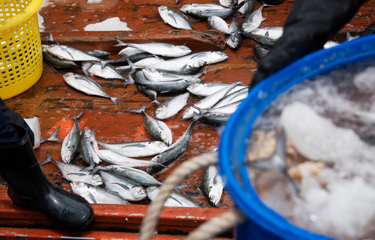The Sustainable Fisheries Partnership (SFP), Whale and Dolphin Conservation (WDC), and Birdlife International have formed a new partnership to protect marine wildlife from bycatch.
The new partnership intends to work directly with major retailers, brands, and foodservice companies in order to conduct bycatch audits. The audits are to identify the level of threats to endangered, threatened, and protected (ETP) species in fisheries that are supplier to the retailers and brands, allowing companies to identify and prioritize actions to take in the seafood supply chain in order to reduce overall bycatch.
The results of this data will be made available, not only to companies, but to the public, via the transparency platform Ocean Disclosure Project.
“Consumers do not want whales and dolphins to be harmed and killed to put fish and shellfish on our dinner plates,” WDC Bycatch Manager Sarah Dolman said. “WDC is delighted to be working in partnership with Birdlife International and SFP to raise these important bycatch issues with retailers, who can directly influence the supply chain and fisheries.”
In a press release, the new partnership said bycatch is one of the most-significant issues affecting the biological sustainability of marine fisheries. Sharks, marine mammals, seabirds, and sea turtles are all at risk of becoming bycatch due to being distributed across the same geographic areas as major fisheries. High-risk species include those with long reproductive cycles and low numbers of offspring.
“Retailers and major seafood buyers can have a huge impact on protecting ocean wildlife through actions in their global supply chains,” SFP Global Markets Director Kathryn Novak said. “There are many proven best practices and new, innovative technologies to address bycatch issues in commercial fisheries that just need to be adopted at scale.”
The first retailer in the world that conducted a bycatch-directed audit of its supply chain was Asda in 2020. The results caused Asda to announce, in 2021, new bycatch commitments – particularly in tuna longline fisheries – in order to lessen the risks to a number of species. Subsequent actions taken by Asda include the adoption of strict requirements on catch technology and best practices in bycatch mitigation, requiring observer coverage on fishing vessels, and mandating humane treatment of sharks.
“This is exactly the kind of collaboration we need to transform fisheries management from the current situation, where action on bycatch is often on the fringes, to a central part of how vessels operate at sea,” Birdlife Marine Program Bycatch Program Manager Rory Crawford said.
Other examples of retailer actions that can address bycatch include those taken by U.S. retailer Publix, which urged its main snow crab supplier to start a fishery improvement project (FIP). The project included a pilot for new ropeless system in order to prevent whale entanglements. In addition, Aldi U.S is testing new Hookpod pilot technology, which shields bait and hooks in longline fisheries until the hooks reaches a certain depth, to keep them out of reach of diving seabirds.
The partnership expected to complete the first bycatch audit by a U.S. retailer, as well as audits by major global suppliers, and other retailers, available later this year.
Photo courtesy of Improvise8survive/Shutterstock







